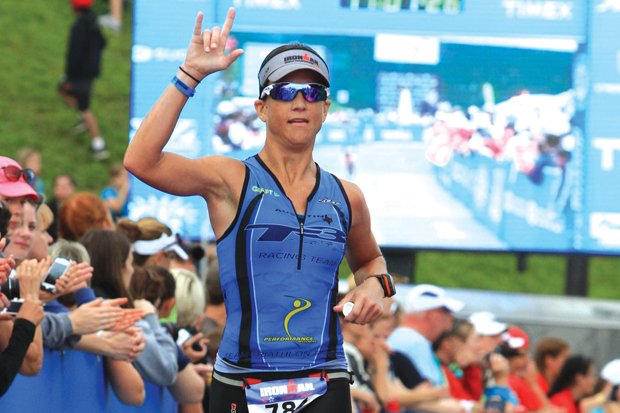Confidence Leads to Success

Most triathletes and coaches track a wide variety of performance metrics to see progress in training: heart rate, paces, times, power, and so on. These are all good indicators of whether training is moving in the right direction. An additional indicator I encourage everyone to look at is “confidence level.”
Being confident—and building a high confidence level in your own performance—is very important for racing successfully. Endurance events always require a lot of mental strength. Athletes who are confident that they can hold certain paces or specific efforts will be able to overcome tough phases in a race easier. Those who have doubts or are uncertain whether they can keep going at a certain speed are more likely to fail.
The tricky issue here is that, generally, success leads to more confidence, but, at the same time, confidence is needed to have a successful race. So, here are some ideas on how to build confidence in training as you get ready for your important “A” race.
Focus! Instead of paying attention to every aspect of training, set priorities and focus on one aspect at a time. For triathletes, it’s hard to have stellar workouts in all three sports every time.
Focus in phases on one discipline and make progress in this sport to build confidence. In the winter, focus on building strength; in spring, focus on building volume and mileage; and then, as you get closer to races, hone in on speed and intensity. Don’t try it all at the same time; that’s more likely to lead to failure and takes a way confidence.
Set ambitious but obtainable training goals. If you constantly miss your training goals, you will lose confidence. Set “stretch” goals that are specific to your phase of training, but make sure you can—and will—hit them. This builds confidence.
For example: During Ironman-distance training, I often set goals in the spring to achieve a certain training volume—such as 35 hours in ten days. With full-time work, this is hard but doable if I include two weekends. Achieving this goal gives me confidence that I can handle high volume.
About a month before an Ironman-distance race, I used to do a tough run workout—15 x 1,000 meters with 200 meters rest—and set a challenging, yet achievable, target pace for the 1,000s. It’s a tough workout; completing it at target pace was always a good confidence builder. Doing so told me that race fitness was there.
Take training races seriously, even if they are “B” or “C” tier races. Repeated failure or mediocre race results take away your confidence. So, if you do race, make sure in most cases that you have successful results. After a series of unsuccessful training races, it is less likely that you will go with confidence into your important “A” race and succeed.
If you train with groups, make sure to train with different levels of athletes. It’s great to do some training with faster athletes. It will help you get faster. For example: I suffered through plenty of bike miles behind pro triathlete James Bonney’s wheel, which nevertheless helped me to improve my cycling and gave me confidence in my cycling capabilities.
However, to build confidence, it is also beneficial to take the lead sometimes and be the fastest in a group. So, make sure to include both types of group workouts in your training.
Local age group athlete Jennifer Walker is a great example of how a high level of confidence can be a good indicator that success will follow. Walker started this training year with ambitious goals, and her target race was Ironman Lake Placid in July. In the winter months, we first worked on running. She set a half marathon personal record (PR) in March, which gave her a lot of confidence that her running was where it needed to be.
In the following months, Walker raced several triathlons up to half Ironman distance (70.3 miles). She took each race seriously enough to finish strong. As a result, she set a new half Ironman-distance PR, qualifying for Ironman 70.3 Worlds in Vegas, and won her age group at Ironman 70.3 in Kansas. She was also smart enough to skip a race after being sick in May. Chances were high that she would not have a good result anyway, and, by canceling, it her confidence level in her race performance stayed high.
With lots of focus and dedication, Walker stayed on top of a tough final build phase of Ironman-distance training. When we met a week before Ironman Lake Placid to talk through the race, I was impressed by her confidence that she would have a great race. The race result came as no surprise; she finished on the podium in her age group and qualified for Kona. Going into her “A” race with a lot of confidence was Walker’s key to success. Aloha!






